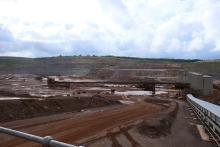The UK aggregates and metals manufacturing sector is making tangible progress in managing its energy consumption, with 76% reporting a beneficial impact on the bottom line as a result of their efforts, according to a new report.
The
Most manufacturers (83%) in the aggregates and metals industries now view energy as a business critical issue – the highest recorded across all the industrial sectors questioned - and more than two thirds (72%) plan to increase their investment in energy management during the next 12 months. The primary drivers behind such activities are to meet regulatory requirements and reduce the organisation’s carbon footprint.
When compared to other manufacturing sectors, aggregates and metals lead the way in terms of having formalised energy management training in place for staff, purchasing energy saving technologies and viewing energy management as on a par with other strategic decisions. The sector also scored highly when it came to aligning energy management strategies with those of production planning.
Assessed alongside sectors such as chemicals and pharmaceuticals, aerospace, glass and solar, food and beverage and automotive, aggregates and metals fared less well when it came to having energy management goals in place for the next five to ten years, as well as having a senior director in charge of an energy management remit.
When questioned about perceived barriers to investing in energy management, aggregates and metals manufacturers were most concerned about uncertainty associated with a return on investment.
Commenting on the findings, Steve Barker, Head of Energy Efficiency and Environmental Care at Siemens Industry, said, “Our findings indicate that the industry has a high awareness of energy issues, but is perhaps held back a little by an approach to investment opportunities. Progress in terms of active and formalised training programmes and recognising the strategic importance of managing energy risk is to be applauded, but the real reward for aggregates and metals businesses is evidenced in the bottom line and the 76% of organisations who say it has improved as a result of implementing energy management measures. This is good news as the sector is recognised, along with glass & solar, as a highly intensive consumer of energy and therefore, cost.”
Barker added that while some UK aggregates and metal manufacturing sector firms are still struggling to recognise the benefits of investing in energy management, the perceived barriers to investment can easily be overcome with the right information and flexible financial support offered by companies like Siemens.
“There are already many manufacturers taking action in this crucial area and, together with expert technology partners, they can help to inspire and educate those who say they have ‘other priorities’ over and above energy management,” said Barker, adding, “For UK industry, and the aggregates and metals industries in particular, the challenges around managing energy consumption will only intensify in the years to come and doing nothing is not an option for businesses that want to thrive.”









